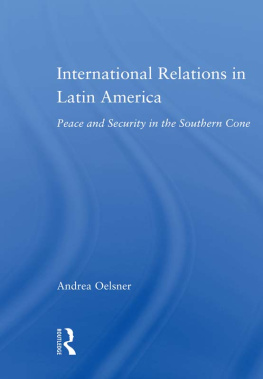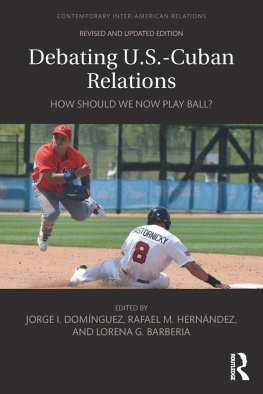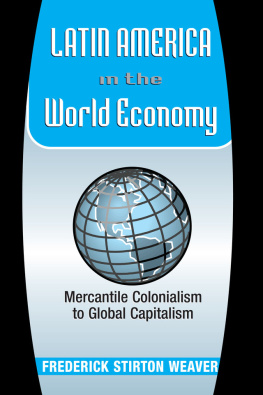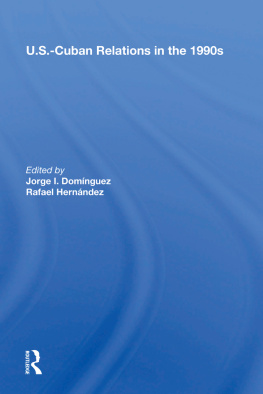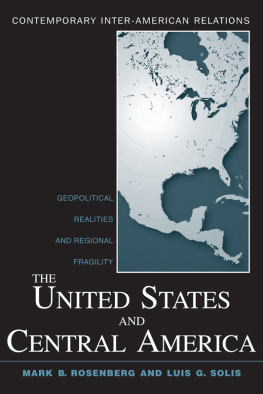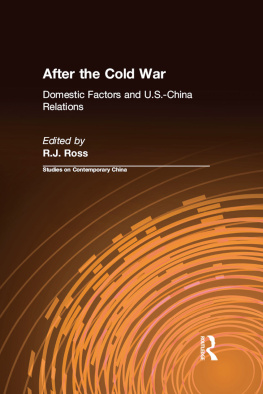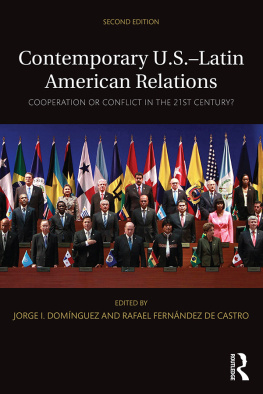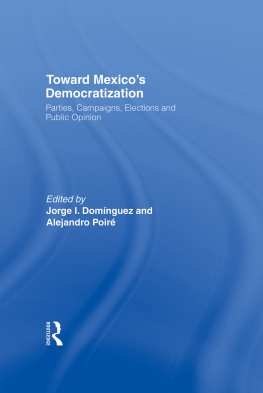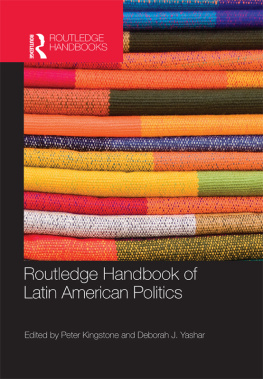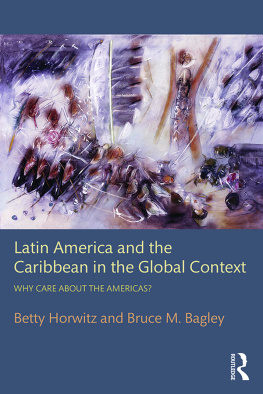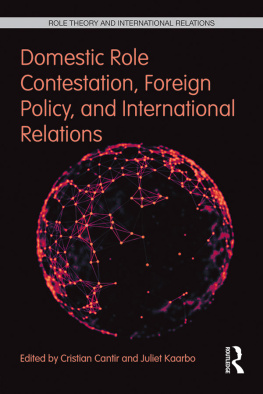ESSAYS ON MEXICO, CENTRAL AND SOUTH AMERICA
Scholarly Debates from the 1950s to the 1990s
Series Editor
JORGE I. DOMNGUEZ
Harvard University
SERIES CONTENTS
1. ECONOMIC STRATEGIES AND POLICIES IN LATIN AMERICA
2. AUTHORITARIAN AND DEMOCRATIC REGIMES IN LATIN AMERICA
3. THE ROMAN CATHOLIC CHURCH IN LATIN AMERICA
4. SOCIAL MOVEMENTS IN LATIN AMERICA
The Experience of Peasants, Workers, Women, the Urban Poor, and the Middle Sectors
5. PARTIES, ELECTIONS, AND POLITICAL PARTICIPATION IN LATIN AMERICA
6. LATIN AMERICAS INTERNATIONAL RELATIONS AND THEIR DOMESTIC CONSEQUENCES
War and Peace, Dependency and Autonomy, Integration and Disintegration
7. RACE AND ETHNICITY IN LATIN AMERICA
VOLUME
LATIN AMERICAS INTERNATIONAL RELATIONS AND THEIR DOMESTIC CONSEQUENCES
WAR AND PEACE, DEPENDENCY AND AUTONOMY, INTEGRATION AND DISINTEGRATION
Edited with an introduction by
JORGE I. DOMNGUEZ
First published 1994 by Garland Publishing, Inc.
This edition published 2013 by Routledge
711 Third Avenue, New York, NY 10017, USA
2 Park Square, Milton Park, Abingdon, Oxon OX14 4RN
Routledge is an imprint of the Taylor & Francis Group, an informa business
Introduction copyright 1994 Jorge I. Domnguez
All rights reserved
Library of Congress Cataloging-in-Publication Data
Latin Americas international relations and their domestic consequences : war and peace, dependency and autonomy, integration and disintegration / edited with an introduction by Jorge I. Domnguez.
p. cm. (Essays on Mexico, Central and South America ; v. 6)
ISBN 0815314906 (alk. paper)
1. Latin AmericaForeign relations1948 2. Latin AmericaDependency on foreign countries. 3. Latin AmericaEconomic integration. 4. Debts, ExternalLatin America. 5. Latin AmericaRelationsUnited States. 6. United StatesRelationsLatin America. I. Dominguez, Jorge I., 1945 II. Series.
F1414.2.L3275 1994
Of all of the worlds regions in the twentieth century, Latin America has been freest from conventional interstate war. Thus scholars have paid more attention to international economics. Latin American and Latin Americanist scholars pioneered much research on international dependency, but also on bargaining between governments and multinational firms, on the prospects for regional integration, and on the extensive debt crisis of the 1980s. The role of the United States and its international interventions has also received scholarly scrutiny.
Latin Americas interstate relations had not always been peaceful. Robert Burr traced the development of an equilibrium of power among South Americas states in the nineteenth century. Such a balance of power occurred only after states had consolidated their internal dominion, extra-continental influence on South America had been curtailed, and channels of communication among the governments had reached the point where each actor understood that its interests could be affected by the activities of others. Several balance of power relationships developed separately at first. The earliest emerged in the 1820s among the states crossed by the River Plate; the second took shape in the 1830s along South Americas west coast. Only in the 1860s did a continental system become consolidated when the River Plate states fought the Paraguayan war at the same time that the west coast states fought against Spain. After the 1880s, this balance of power became increasingly effective in managing continuing conflicts without interstate war.
Wolf Grabendorff examined similar issues in the years after 1945. From the mid-1940s to the mid-1960s, he argued, U.S. hegemony, the attention to Cold War issues, and the concerns with domestic security problems dampened the likelihood of interstate conflict. From the 1960s to the early 1980s, however, military governments increased the level of interstate conflict, though generally short of war. Grabendorff identified five kinds of conflicts: some focused on ideological issues (communism, democracy, human rights), some on the scope of U.S. or British hegemony, yet others on territorial and border disputes, a fourth set centered on disputed access to natural resources, and, finally, there were conflicts over illegal migration. All five had led to acts of war, and some to actual war. And yet the regions frequency of interstate war remained below that of the rest of the world.
Governments and scholars turned their attention mainly to international economic issues. In the 1960s, regional integration efforts received special attention. Ernst Haas and Philippe Schmitter examined the prospects for integration in Latin America. They analyzed background conditions, conditions at the time of economic union, and integration process conditions for the Central American Common Market (CACM) and the Latin American Free Trade Association (LAFTA) in the light of comparative evidence. They were especially interested in the chances of automatic politization, that is, the likelihood that the process of initially technical and non-controversial economic integration would spill over to foster political integration. Despite some favorable trends, they concluded against such prospects in the case of the LAFTA; in the case of the CACM, though cautious, they believed that the prospects for political integration were the best outside of the European Economic Community.
By the end of the 1960s, Miguel Wionczek had written an epitaph for Latin American integration. Though regional integration schemes continued to prosper, regional integration did not. In 1969, El Salvador and Honduras went to war over territorial and migration disputes, deeply hurting the CACM. The CACM had fostered intra-regional trade especially in manufactured products, but at substantial economic and social costs because of high protectionist barriers set up around the region. The LAFTA succeeded even less, as Haas and Schmitter had expected, because governments were unprepared to launch a genuine integration process. The unevenness of economic development at the outset of the integration process made the LAFTA task formidable and, in the end, unachievable.
In the mid-1960s, Latin American scholars turned to analyze the structure of international dependence to understand the insufficiencies and distortions of development. Theotonio dos Santos argued that these economies were conditioned by the development and expansion of another economy to which the former is subjected. Dependent countries, therefore, could develop only as a reflection of the industrial countries. Underdevelopment was a consequence and part of the process of the world expansion of capitalism and integrally linked to it.







